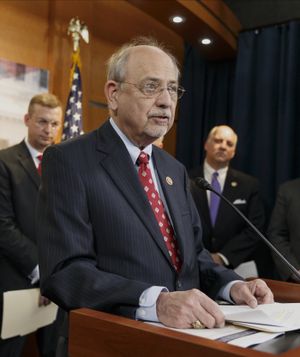Rep. Doc Hastings leaving Congress; enviros say ‘good riddance’
CONSERVATION -- Some conservationists didn't hide their happiness to hear that Rep. Doc Hastings, R-Wash., is retiring after 20 years in Congress, an unexpected announcement that drew both cheers and jeers Thursday in the nation’s capital.
As chairman of the House Natural Resources Committee, he's been a barrier to many efforts championed by environmentalists, especially those who objected to his persistent moves to open more public lands to development and to change laws dealing with endangered species, among other things.
“It’s really good riddance,” said Athan Manuel, director of the lands protection program for the Sierra Club.
Click "continue reading" for the full story from the McClatchy Washington Bureau.
WASHINGTON — Washington state Republican Rep. Doc Hastings is calling it quits after 20 years in Congress, an unexpected announcement that drew both cheers and jeers Thursday in the nation’s capital.
His departure is welcome news to environmentalists who have long battled him as chairman of the House Natural Resources Committee. They objected to his persistent moves to open more public lands to development and to change laws dealing with endangered species, among other things.
“It’s really good riddance,” said Athan Manuel, director of the lands protection program for the Sierra Club.
For business groups and conservatives, though, Hastings’ retirement at the end of this year means the loss of one of their strongest allies, a pro-drilling congressman who could always be counted on to question President Barack Obama’s energy policies.
“He proved to be an able steward of federal lands and a champion for rural agricultural and timbered communities,” said Republican Rep. Greg Walden of Oregon.
And his constituents will be looking to find a replacement with enough clout to take over a pet cause for Hastings: getting Congress to provide billions of dollars to clean up the Hanford Site, the location of the world’s first full-scale plutonium production reactor and now the nation’s biggest repository of nuclear waste.
The site, which holds two-thirds of the nuclear waste in the United States, is in Hastings’ 4h Congressional District in the central part of the state, and he created the House Nuclear Cleanup Caucus to promote the cleanup effort. He often cited his work on Hanford when environmentalists attacked him.
Sen. Patty Murray, the state’s Democratic senior senator, has little in common politically with Hastings but called him “a dedicated public servant” who fought hard for his district’s interests.
“I always knew that we had each other’s back over the years when it came time to showing either the new Republican or Democrat in the White House that Hanford cleanup demanded their attention and that we were going to hold them accountable,” Murray said.
It’s uncertain who will get Hastings’ gavel, but early speculation focused on Republican Rep. Rob Bishop of Utah, another Westerner who represents a state where nearly two-thirds of all the land is owned by the federal government.
Hastings, first elected in 1994 as part of the GOP landslide that made Newt Gingrich speaker of the House of Representatives, said his family “weighed heavily” in his decision to retire after winning 10 terms. He said that he and his wife, Claire, now have eight grandchildren and that all three of their adult children now live in Washington state.
“Claire has always been my greatest supporter and the hardest part of every week is leaving her Monday morning to catch an airplane to Washington, D.C.,” said Hastings, who turned 73 last Friday.
“While I have the ability and seniority to continue serving central Washington, it is time for the voters to choose a new person with new energy to represent them in the people’s House,” Hastings said.
Hastings, whose real name is Richard Norman Hastings, entered politics in 1974, getting elected as chairman of the Franklin County Republican Party. He became an early backer of Ronald Reagan, serving as a Reagan delegate at the 1976 Republican National Convention when Reagan challenged the incumbent president, Gerald Ford, for the GOP nomination. He was elected to the Washington state Legislature, where he served from 1979 to 1987. He won his congressional seat in 1994 by defeating the incumbent Democrat, Jay Inslee, who is now the state’s governor.
In addition to leading the House natural resources panel since January 2011, Hastings headed the House Ethics Committee from 2005 until 2007.
For environmentalists, his time leading the Natural Resources Committee will remain the distinguishing mark of his career. The Sierra Club’s Manuel, who tangled with Hastings over the congressman’s failed efforts to open Alaska’s Arctic National Wildlife Refuge to oil drilling, accused Hastings of displaying “a shocking lack of vision” as head of the committee.
“That’s a great committee to be a chair of, you can get some great stuff done,” Manuel said. “And he spent the whole time complaining about the need for more oil and gas drilling and coal mining in the United States.”
Back home, Hastings has been a political force in a reliable GOP district.
Rep. Cathy McMorris Rodgers of Spokane, who as chair of the House GOP conference is the fourth-ranked House leader, said that Hastings’ brand of politics always played well in his district, with the congressman receiving never less than 60 percent of the vote. She said he easily would have won re-election this year.
“Doc’s knowledge of farming, forestry and river resources made him a natural leader in these areas,” she said.
The highest praise of all came from Hastings’ boss, House Speaker John Boehner, R-Ohio, who said Hastings had served in Congress “with honor, humility and distinction.”
“In addition to being a skilled legislator and leader, he’s the epitome of grace and class, and he’s a very dear friend,” Boehner said. “I’m grateful for Doc’s service to our institution and our nation.”

